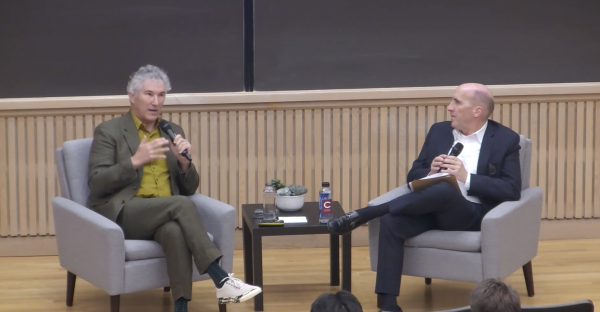Students Ask The Question: “Save Colgate?”

“There are so many other ways that wouldn’t have pissed everyone off,” Student Government Associate Vice President senior Casey McCormack said. “To me it was the worst possible move; they burned bridges everywhere.” On Wednesday, October 27, advertisements for a website (www.sa4c.com) appeared and sparked controversy on campus. Promoted by a deluge of flyers and a billboard on Route 12B, the site has spurred conversation in dining halls, dorm rooms and classrooms. The website charges that Colgate is “threatened by the militant liberalism that permeates the University.” It claims a “cultural war” being led by the Colgate administration “to create a student body of androgynous graduates who all tow the line of political correctness.” It cites “battles” in this war including the University’s attempt to “blackmail the Greek societies into selling their houses to the University” and “the dumbing-down of core curriculum requirements.” Additionally, the website alleges that the University has been overrun by political correctness. First-year students are no longer referred to as “freshmen”; the Raiders are no longer the “Red Raiders”. The website charges the University with attempting to “attract a study body that places a priority on “diversity” – a code word for anyone who is not a white, heterosexual male.” The response on campus has been widespread. “Generally, most people tend to agree that the website was a horrible approach and that the content is not exactly valid,” McCormack said. “I’m conservative, and I do think there is a liberal bias [at Colgate]. Most liberal and conservative students and professors, however, agree that the site was inappropriate.” Regardless of the site’s appropriateness, the result has been a dialogue on campus amongst the students and faculty. “I’ve been pleased with the students and faculty who have engaged in critical thinking,” University President Rebecca Chopp said. “The students have raised the issue of public accountability.” Professors have used the website as a tool in the classroom, whether analyzing the arguments in a logic course or discussing how it fits into the political scene in America. “The site has been put into a framework under the lens of discourse,” Dean of the College Adam Weinberg said. “This is an example of the students engaging each other in thought-provoking ways.” Still, many members of the community have found the site’s content offensive. At the Black Solidarity Day Speak Out, sophomore Makina Perry stressed the importance of standing together as there are “people out there who can create websites and blatantly express their racist feelings.” “I’m most concerned about the LGBTQ and students of color and the suggestion that these students didn’t earn the right to be here,” Chopp said. “The community has responded well, though, questioning all of these stereotypes.” In response to these stereotypes, a number of Colgate students organized a campus forum, “Understanding the Liberal Arts.” A faculty panel of six took questions from the audience on Thursday night in the Hall of Presidents. The faculty members tackled questions from the relationship between diversity and academic freedom to the extent to which a professor’s personal views belong in the classroom. In an effort to shatter some of the stereotypes that have permeated campus since the unveiling of the website, Jean Picker Associate Professor of Philosophy and Religion Clarise Martin presented the audience with the top three majors for both white students and students of color over the past five years. Both lists were identical: political science, economics and English. “The website statements promote old stereotypes,” she said, “but there is nothing like hard data to put stereotypes into perspective.” Harry Emerson Fosdick Professor of Philosophy and Religion Jerome Balmuth stressed that contrary to the belief propagated by the website, the liberal arts are not static. “The University changes,” Balmuth said. “The catalogue now is different than it was 30 years ago. Women’s Studies courses wouldn’t be here 50 years ago when Colgate was all-male. Rather, the liberal arts curriculum is continually evolving from new interests and concerns.” With the University continuing to seek to expand its diversity, the issues brought to light by the controversial website have given rise to discussion on campus. In an address to the student body at the forum, Chopp commended the student’s response. “The response on campus has been exactly what the faculty and board and I want,” Chopp said. “You have engaged in critique and have done so in a full and civic way.”




